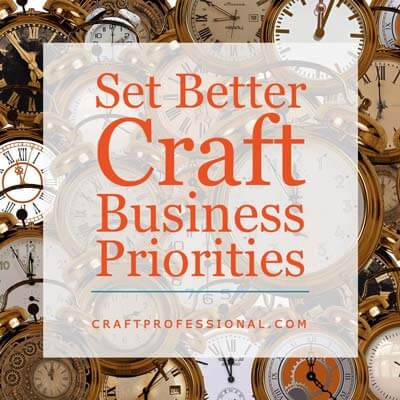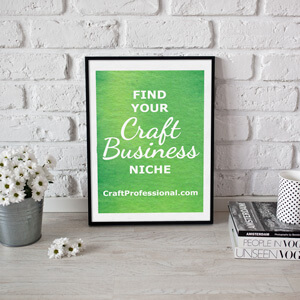Follow Your Passion is Terrible Advice
Here's why you should ignore anyone who tells you to follow your passion, and what you should do instead.
This morning I had an interesting email exchange with some of my career advisor friends. We were talking about the advice you often hear that you should just "follow your passion" and everything will fall into place for you.
I worked for many years as a career advisor, and often, when I'm writing posts for this site, I think I haven't really left that field of work behind. I've just laser-focused it on helping craft business owners.
So, in the midst of this email exchange with my friends, I wondered, how does this "follow your passion" advice relate to craft business owners?
Follow Your Passion is Tempting, Charming, but also Dangerously Incomplete Advice
The idea that, when you build a business or a career, you should simply follow your passion and everything will fall into place is tantalizing. Who doesn't want to believe that if we simply do what we love, everything will work out just fine?

Follow your passion is a seductive idea, but it's terribly incomplete business advice.
If you have a craft business, you have probably followed your passion to some extent.
There's nothing wrong with that.
It's one piece of the puzzle, but it's not everything. It's just a small part of a much bigger picture.
Follow your passion is incomplete advice that is often given by people who have had a spectacular career but who have never actually been involved in the nitty-gritty realities of actually helping people launch a career or business. It implies that if you just do what you love, success will automatically follow. That, unfortunately, is magical thinking.
What if you don't have a passion?
If you're building a craft business, your craft is probably your passion. But some people don't have a passion. They have values and interests but not something you'd call a passion.
If you're that person who doesn't really have a passion, then the advice to follow your passion is not helpful, and it may make you feel stressed and inadequate. You may wonder what is wrong with you if you don't have a passion.
What if you follow your passion but don't succeed?
If following your passion is supposed to automatically, magically lead to success, what if you don't succeed? Are you then supposed to believe you weren't passionate enough? Pinning all of your hopes for success on one factor - your level of passion - provides an extremely unhelpful, incomplete picture of how to chase your goals.
Follow Your Heart, But Take Your Brain With You

Alfred Adler was a respected psychotherapist.
His advice to people was, "Follow your heart, but take your brain with you."
In my opinion, that advice is much more helpful and complete. It applies to a lot of situations in life, and, in my mind, it applies particularly well to career and business building.
"Follow your passion" can be a good starting point for those who have a passion, but I would challenge you to also follow your heart, and take your brain with you.
What does that mean?
Follow Your Heart
Following your heart to me means you take into account all of those factors that make you uniquely you.
Your Values
You may value any number of things. Some examples of values that can be achieved or expressed in your business are:
- beauty
- harmony
- independence
- family time
- financial achievement
- or community involvement
There are plenty of other values you could express in your business.
Whatever your own values are, the better you align your business with your values, the happier you will be. If your business fits with your values, if you appreciate the big-picture importance of what you are doing each day, it will be much easier to work hard and put aside any day-to-day stresses.
Your Aptitudes
Aptitudes are the things you are naturally good at. You may have a strong aptitude for things like:
- math
- or language
- or manual dexterity
We all have our strengths (the things we are naturally good at) and our challenges (the things that don't come easily for us). The more you understand your strengths and challenges, the more prepared you will be to build your business around your strengths, and minimize or find other solutions to areas that are challenging for you.
Your Personal Style
When I say "personal style" I'm not talking about your fabulous velvet jacket, or your stylish red shoes. In this context, I mean your personality - how you get energy, gather information, make decisions and organize your world.
- Are you introverted or extroverted?
- Spontaneous or a planner?
- Do you organize information by writing out pro and con lists or do you go with your gut instinct?
- Do you make decisions based on logic or based on feelings?
Your answers to those questions make up your personal style (and your MBTI type - which you can find for free here if you're curious). The better you understand your personal style, the better you can develop a business that is a good fit with your own personality.
Your Interests

Of course, there are also your interests to consider. Interests are primarily what people are talking about when they tell you to follow your passion.
I think craft business owners have this part largely figured out.
You have probably grown a business around an interest. However, sometimes you can combine your interest in a specific type of craft with another interest to make an even stronger product. Thinking about all of your interests can help you make connections that are beneficial to your business.
Take Your Brain With You
Taking your brain with you means considering all of the practical details that aren't as romantic as your "passion" but they can have a huge impact on your success. And, of course, achieving success (however you define it) means you get to continue to follow your passion.
The Business Market
Have you assessed your product?
Consider:
- how it compares to competitors
- who it appeals to
- how much profit you can build into the price
- how you can stand out
Doing that type of analysis can help you develop realistic expectations for your business and minimize mistakes. This type of analysis can also help you push your product development further so you have a stronger product that appeals to your target market.
Income Potential and Expectations
Estimating how much you can reasonably expect to make from your business can be tough to do accurately in the early stages of business development. However, it's still smart to think through the process of how much you believe you can reasonably expect to sell (and profit) in your chosen venues.
That type of assessment may help you find holes in your plan that need fixing or new opportunities you hadn't considered.
Impact on Others
Your business might be your dream, but how do it align with your partner's goals?
Your business decisions will likely affect significant people in your life. If you have a spouse, children, or other important people in your life, your business will run more smoothly if you take into account the impact on those significant people and get their support as much as possible.
Experience and Skills
- What experience and skills do you already bring to your business?
- Do you have any special experience or skills that could give you an advantage?
- What skills will you need to develop?
If you take an inventory of your skills and experience, you might find areas you need to brush up on, and you might make some surprising connections that will help you develop a stronger business.
Your Health
Here's a factor people often overlook. If you have any health issues, you need to consider them in planning your business.
For example, a chronic physical injury can flare up if you get into the type of repetitive work that is often involved in craft production. Sometimes ergonomically designed tools and a well-designed work station can prevent those problems. Sometimes you will need to alter your production process to accommodate injuries.
No assessment of your craft business plan is complete without a good look at your health as it relates to your business.
Building a Complete Picture
You can see, the big picture is not as sexy as "follow your passion." But it's far more complete and helpful.
Deciding to "follow your heart, but take your brain with you" takes more effort and planning to figure out.
If you have a passion, you know what it is. However, you might not know off the top of your head your work values, or aptitudes or the income potential for your business. It takes some concentrated effort to work out those factors.
In the long run, though, if you put in that effort, you will be in a better position to build a business on firmer ground. You'll have the information to create a business you love (follow your heart) and that fulfils your needs, expectations and responsibilities (take your brain with you).
Passion is great, but when it comes to business building, it is incomplete. That's why I say, "Follow your heart, but take your brain with you."





New! Comments
Have your say about what you just read! Leave me a comment in the box below.